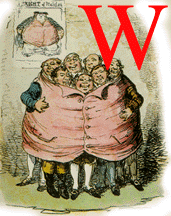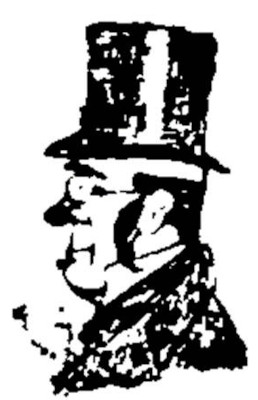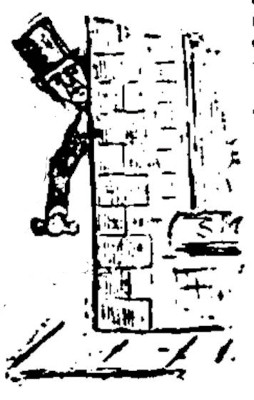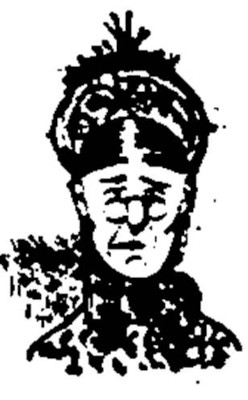This article has been transcribed from a copy of the Cardiff Times in the online collection of scanned Welsh newspapers 1804-1919 in the National Library of Wales, with grateful recognition of the free access accorded to all readers. A decorative initial has been added, and where necessary paragraph breaks have been introduced for easier reading.
The article follows a long-established form: a catalogue or dictionary of the ‘types’ of the phenomenon under scrutiny — here the debt collector. Touchstone’s seven degrees of the lie in As You Like It was perhaps the best known precedent. Samuel also uses the well-known pose of being no better than the people criticised: a British, de-sexualised version of the French l’homme moyen sensuel. Samuel has mastered the art of imitating the writing of the unschooled, as Charles Dickens, for example rarely did. — David Skilton


hen, sir, I first broached to Mrs Samuel my intention to write to you on the subject of duns, she somewhat indignantly endeavoured to dissuade me for, said she, ‘Samuel, although I don't doubt that you know as much about duns as most men; indeed, I might say, as most authors, yet it isn't wise to let everyone know it. You'll injure my credit with Mrs Grabstuff, my dress-maker, and with Tapelegs, the draper; you really musn't think of such a thing.‘ But your Samuel, sir, is nothing if not candid, and he writes this article in some degree hoping that one of the ‘crowned heads,’ or one of the noblemen or merchant princes who habitually read this journal may be moved to commiseration and may be induced to come forward to free him from the persecution of dun-dom to which he is subjected. I need not go into details, sir, as to how I came to be so immersed in the slough of debt as to be the perpetual victim of duns; suffice it that your Samuel has usually found that he only possessed a pound when he absolutely required thirty shillings, though why this should be so he is positively unable to say. Without going into this trivial matter, however, he may remark at this juncture that he has ‘done’ many a too exacting dun, and done him as brown - to use a common expression — as was possible under the circumstances. Duns, sir, may be classified under various heads. There is the imploring and persuasive dun; the indignant dun; the obstinate dun; the artful dun, and the deceptive dun, who only duns you in order that you may keep him quiet by getting more goods from him.

I think I will take the indignant dun first - he has often wanted to take me, and ‘put me where he could find me,’ as he has said. He is generally a blustering man with a red face and full eyes. and plethoric habit of body, and he is not uncommonly a butcher. Your payments do not come up to his expectations; he sends a note to the effect that he must have something ‘on account;’ you take no notice thereof; then you receive a very greasy and suety note, written in a vile hand, to the following effect: ‘Sir, i have wayted long enuf no brass no beef is mi motter and cant suply no more meet John Shortweght.’ Possibly you muster sufficient courage to call on Mr Shortweght and to tell him that he is trying to ‘bounce’ you, and is pressing you unduly. In such a case you will find that Mr Shortweight is, like a smothered volcano, longing to break out. As you expatiate to him on his harshness he will chop savagely with his cleaver at bits of meat which he puts upon the block, as though he were in imagination converting you, his creditor, into mincemeat, or cutting you up into prime bits for sale at the window on Saturday night. Well, a month will elapse say, and then you are informed that Mr Shortweght has called for his account, and wants ‘pertickler’ to see you. The servant having already most unwisely confessed to your being at home, you send her out to say that you are most busily engaged with a gentleman, but that you will call in the course of a day or two. You do not call; indeed, you keep as far away from Shortweght's as ever you can. Finally, after you have put Mr Shortweght off by this and other methods times out of number, he will some day turn up in a state of profuse perspiration and violent anger, and absolutely refuse, in a loud voice, to depart until his bill has been paid. When the servant endeavours to shut the door, he puts a huge foot between the door and the jamb, and says that in his belief the whole lot of you are a pack of swindlers, who want to do a poor, but of course honest, butcher out of his just due. It generally happens, sir, that when a contretemps of this sort occurs, you have a morning caller in the house, upon whose opinion as to your stability and integrity of character you most particularly wish to build, and it invariably happens that your neighbours on both side are taking an airing at their front doors at the same time. Shortweght has evidently come out to make a ‘scene,’ so it is best to admit him at once and ‘square’ him as best you are able.

The imploring debtor is generally a small tradesman who cannot afford to wait, and who yet does not desire to give you offence. His dunning most often takes the form of notes on blue paper, and enclosed in envelopes equally blue. He begins the siege by telling you of the ‘heavy payments’ he is compelled to make, and he goes on to say that he is pressed for money or he would not ask you; then he informs you how reluctant he shall be to put the matter into the hands of a ‘sollisiter’; then he writes again to ask for a trifle on account. It is better to pay him the money — if you have it. The obstinate dun is the caller who, when the servant girl, scenting danger from afar, says that you are not at home, insists that you are, and that you are ‘a shufflin' of him." The servant upon this makes a show of indignation, but the obstinate dun is not to be easily brow-beaten, but asks when you will be at home. When he is informed that your return will take place during the course of the evening he says he will call again, and he does. He will call every hour of seven consecutive days at a stretch, unless the servant tells him at once that you have gone to stay for a twelvemonth with a friend in Hong-Kong. He will call at six in the morning and wake you and all the household by his clamouring at the door, and he will drop in upon you at eleven at night. Depend upon it, you will never get rid of him till he has frightened the servant, given your wife a fit of ‘nerves,’ and goaded your eldest son into assaulting him.

The artful creditor is generally a tailor, who has positively entrapped you by his specious manner into giving him an order. He will go to your favourite hostelry and wait till you come in, and then, in the presence of all your friends, ask if he can have a quiet word with you outside. He will likewise stop you in the street when you are with people you particularly esteem, and will pretty audibly ask when he is to have a settlement of ‘that little account,’ which has been ‘too long outstanding already.’ If you turn rusty [ill-tempered] with him, he will what he calls ‘up and speak’ and tell you in a loud voice that you are ‘no gent," and that he was warned beforehand not to trust you. In his calls upon you, he is excessively artful. He generally prowls about till he sees you enter your dwelling, and then, when he is told that you have gone away for ten days, he turns derisive and satirical and says that it is no use, and that he is not to be ‘had’ like that. Sometimes he will look through the keyhole when he hears anybody moving about the passage after his first knock. In such a case as this, it is best to have the garden-squirt ready at the keyhoIe, but take care that you do not make a mistake and let the clergyman of the parish have the full benefit of your dose upon his spotless garments.

Perhaps the most difficult dun of all others to avoid, sir, is the highly genteel, somewhat clerical looking man - a man full of a mouldy sort of respectability who, with an umbrella in one hand and a book in the other, calls and asks in somewhat simpering tones if he can see you. So unlike the ordinary dun is he that even the most wary of domestics admits him. He turns out to be a member of the debt-collecting class - a member of that set which but too frequently apes the functions of the duly qualified solicitor by issuing processes and by drawing up wills, which, happily, frequently furnish food for the members of the bar by giving them swinging law suits. His ‘make-up,’ I may mention, is most carefully studied, and is donned with intent to deceive. Let me not forget the creditor who writes insulting post cards with the most reprehensible persistency. Most frequently he is a man to whom you owe the veriest trifle, but who, on the principle of the inverse ratio, is correspondingly impertinent and implacable. His postcards are couched in somewhat cutting verbiage and something in this style:— ‘When are you going to pay me that; shall korl about to-morrow. You ought to be shamed to kepe a pore man waytin'.’ As time goes on, the intensity of the language indulged in increases, and we have a postcard in something like the following terms:-- ‘Shall not korl no more, but take other advise an' mayke yer sit up; folkes as thort anythink of theirselves would have pade hup previous.’ Should this man venture to sue you, show his letters to the county court judge, and that important functionary will make him ‘sit up,’ to use his own phrase.
The dun who hangs around corners and prepares unpleasant little surprises for one is a dreadful bugbear. He is generally a reasonable dun — the sort of man who appeals to your better feeling in ad misericordiam fashion and says, ‘How could you go for to put this sort o' work on me.’ One specimen of this kind sir, was so furtive in his movements in his search for your Samuel, and prowled about so suspiciously that he was locked up by the police on a charge of being a suspected person and loitering with intent to commit a felony, and I am not surprised at it. This little unintentionally friendly act on the part of the police procured for me at least six months' grace, so far as that particular creditor was concerned.
Beyond all other creditors, elderly spinsters are the most to be feared by the impecunious debtor. When not paid off promptly to the day, it is their custom to vent their grievances to your neighbours, to have fits of hysterics in your hall, to deliver impassioned addresses touching your monetary and social delinquencies to your domestics, and ‘to up and tell you in your face what you are’ - and what you are not. Naturally one of this class always says that you do not pay her because she is a poor, defenceless woman, but that if she were a man — which she is not, of course — you would be made to ‘pay up sharp.’
Then, sir, I find that I have got upon my list the dun who has been your friend, and is never tired of reminding you of that fact, and the dun who has bought up all old debt that your original creditor never hoped to get. Goodness gracious — what a lot of duns there are. There goes - another knock at the door! Now, who is it? Is it Puffy, the baker, or Shortweight, the butcher, or old Mrs Vitriol, the landlady? And calling in such weather as this surely this will damp their ardour. ‘Mr Shortweght won't wait any longer, eh?’ Wish that his weight were longer. Drat 'em all, say I.
Last modified 21 October 2021